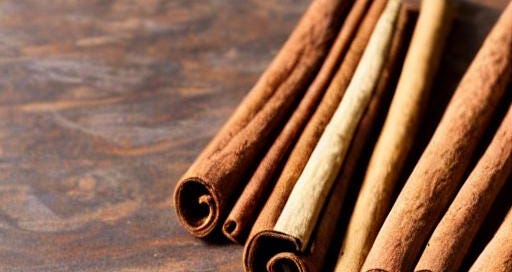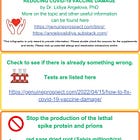I'm sure you would love to learn that cinnamon, that wonderful addition to cappuccino, hot chocolate, cookies, and cakes, is also a medicine. The spice that makes us so happy is a farmacy full of things that heal both the body and the soul.
So, what exactly is in the spice cinnamon which comes from the small tropical evergreen trees Cinnamomum zeylanicum and Cinnamomum cassia?
Cinnamon is source of calcium, iron, manganese, magnesium, phosphorus, potassium, vitamin K, antioxidants (choline, beta-carotene, alpha-carotene, beta-cryptoxanthin, lycopene, lutein, and zeaxanthin), flavonoid compounds (gossypin, gnaphalin, hesperidin, hibifolin, hypolaetin, oroxindin and quercetin). Essential oils include trans-cinnamaldehyde, cinnamyl acetate, eugenol, L-borneol, caryophyllene oxide, b-caryophyllene, L-bornyl acetate, E-nerolidol, -cubebene, -terpineol, terpinolene, and -thujene. Cinnamon also contains coumarin.
How can cinnamon help?
Flavonoids inhibit nuclear factor kappa-light chain activity. Prolonged activation of these chains has been observed in a variety of pathological conditions including immune and inflammatory disorders, autoimmune diseases, cancer, and atherosclerosis. It means that diseases caused by overactivation of these chains can be alleviated by regulating these chains. Because of this, I recently added cinnamon to the list of beneficial food supplements for people affected by COVID-19 vaccines. Take a look.
Can protect the body from oxidative damage caused by free radicals.
A role of oxidative stress has been postulated in many conditions, including atherosclerosis, inflammatory condition, certain cancers, and the process of aging. Oxidative stress is now thought to make a significant contribution to all inflammatory diseases (arthritis, vasculitis, glomerulonephritis, lupus erythematous, adult respiratory diseases syndrome), ischemic diseases (heart diseases, stroke, intestinal ischemia), hemochromatosis, acquired immunodeficiency syndrome, emphysema, organ transplantation, gastric ulcers, hypertension and preeclampsia, neurological disorder (Alzheimer's disease, Parkinson's disease, muscular dystrophy), alcoholism, smoking-related diseases, and many others.[17] https://www.ncbi.nlm.nih.gov/pmc/articles/PMC3249911/
Cinnamon has antimicrobial properties. It provides valuable assistance in the treatment of bacterial and fungal infections.
The following paper is particularly noteworthy because the extract obtained from a cinnamon stick resulted to be active at room temperature (~23 °C) against L. monocytogenes, S. aureus, and Salmonella enterica in a food matrix different from meat and represented by cheese, suggesting that the extract is a potential natural food preservative [66]. Another interesting investigation reports the antibacterial activity of cinnamon bark essential oil and its main constituents, trans-cinnamaldehyde and eugenol against Cronobacter sakazakii and C. malonaticus, which are opportunistic pathogens that cause infection in children and immunocompromised adults. https://www.ncbi.nlm.nih.gov/pmc/articles/PMC4586554/#:~:text=The%20antibacterial%20activity%20was%20expressed,after%206%20h%20of%20incubation.
As you can see, cinnamon is one of the most versatile natural drugs. Of course, this does not imply that you should consume a large amount of it. If you are a healthy adult, you can add a little more to your desserts and drinks. If you are sick, take more, but always check for medication interactions if you are taking any. While allergic reactions are uncommon, consuming more or for the first time should be done in the morning when someone else is present. In this case you would be able to detect any allergic reactions and look for help.
👇
Coumarin is a flavouring substance which is contained in relatively high concentrations in cinnamon varieties collectively known as "Cassia cinnamon". In especially sensitive persons, even comparatively small quantities of coumarin can cause liver damage, although the effect is usually reversible. https://www.bfr.bund.de/en/faq_on_coumarin_in_cinnamon_and_other_foods-8487.html#:~:text=Coumarin%20is%20a%20flavouring%20substance,the%20effect%20is%20usually%20reversible.
💡
Cinnamon is a natural fungicide, insecticide, and fertilizer.
Take a look at the other articles of the Natural Remedy Series
https://angelovalidiya.substack.com/s/natural-remedy-series
I do not sell any of the products mentioned here, and my main sources of income are my blog and my substack.
Please consider making a small donation via my blog or becoming a paid subscriber to support my work. It assists in keeping all of my articles free ❤.
References
http://if-pan.krakow.pl/pjp/pdf/2010/5_778.pdf
https://pubmed.ncbi.nlm.nih.gov/30668393/
https://bilkolechenie.bg/article/polzite-i-vredite-ot-kanelata
https://www.ncbi.nlm.nih.gov/pmc/articles/PMC4003790/pdf/ECAM2014-642942.pdf





